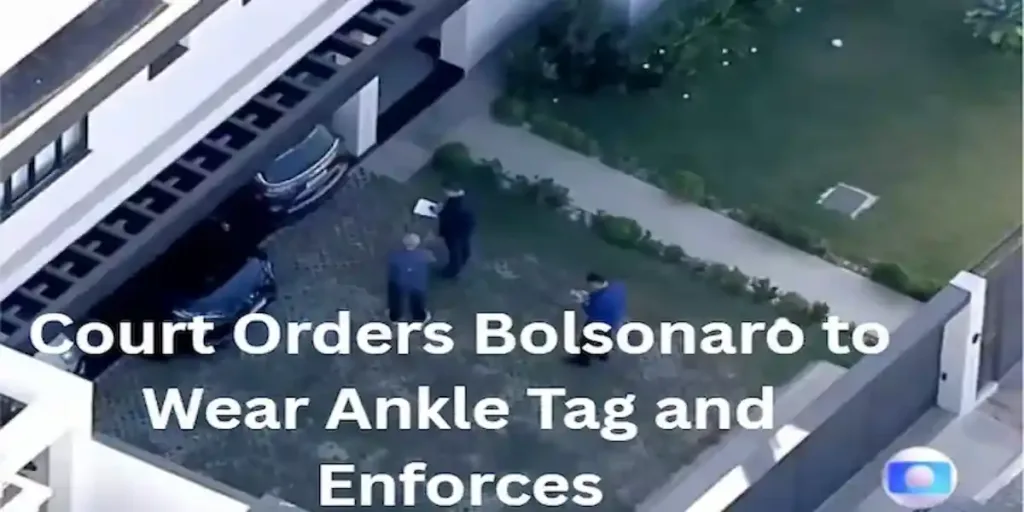A Brazilian court orders Bolsonaro to wear an ankle tag and imposes a curfew as part of an ongoing investigation, reshaping Brazil’s political landscape.
In a development that has stunned Brazil and captured international headlines, the court orders Bolsonaro to wear ankle tag while enforcing a strict night curfew as investigations continue into his conduct during and after his presidency.
This decision marks a pivotal moment for Brazil, reflecting a shift toward holding leaders accountable regardless of their previous status.
Details of the Court’s Decision
The ruling came from Brazil’s Supreme Federal Court, citing ongoing concerns about Bolsonaro’s potential to interfere with evidence and witnesses.
The court orders Bolsonaro to wear ankle tag to monitor his movements while ensuring compliance with the curfew, which restricts him to his residence between 8 PM and 6 AM daily.
This decision follows months of investigations tied to allegations of corruption, election misinformation, and potential abuse of power during his term.
Prosecutors argued that the electronic monitoring and curfew were necessary measures to preserve the integrity of the ongoing legal process.
How Did This Situation Develop?
Tensions have been rising since Bolsonaro left office, with investigations focusing on his alleged attempts to undermine Brazil’s democratic systems.
Recently, evidence surfaced suggesting Bolsonaro may have engaged in discussions to overturn election results. As these findings emerged, public outcry intensified, pushing the judiciary to take decisive action.
As a result, the court orders Bolsonaro to wear ankle tag to ensure his movements remain transparent to authorities while the investigation proceeds.
Additionally, the curfew aims to prevent any attempts to influence or intimidate key witnesses involved in the case.

Public Reaction Across Brazil
The decision has sparked widespread discussions across Brazil’s political and social landscape. Supporters of Bolsonaro claim that the measures are excessive and politically motivated.
However, others argue that accountability should not be compromised, even for a former president. Many Brazilians believe that the court orders Bolsonaro to wear ankle tag signifies a new era of legal accountability, reinforcing the idea that no individual is above the law.
With public trust in democratic institutions often fragile, this action could restore faith in Brazil’s commitment to transparency.
The Symbolism of the Ankle Tag
Electronic monitoring devices carry strong symbolic weight. For a former president to be seen wearing an ankle tag underscores the seriousness of the allegations and the determination of the judiciary to enforce justice.
While Bolsonaro retains his right to defend himself in court, the measures indicate the court’s commitment to ensuring the investigation is not obstructed.
Moreover, the curfew imposed along with the court orders Bolsonaro to wear ankle tag limits Bolsonaro’s ability to travel or organize public gatherings that could escalate political tensions during this sensitive period.
International Implications and Brazil’s Image
Globally, this development has positioned Brazil as a country willing to challenge political figures in the pursuit of justice.
Transitioning from turbulent times under Bolsonaro’s administration, the current government and judiciary appear focused on upholding democratic values.
This action may also encourage other nations to examine how they handle accountability for former leaders, especially when concerns of democratic erosion and corruption arise.
The court orders Bolsonaro to wear ankle tag could become a landmark precedent for Latin America’s political environment.
Impact on Bolsonaro’s Political Future
Although Bolsonaro maintains a loyal support base, these restrictions could significantly impact his political comeback efforts.
The legal challenges may hinder his ability to participate actively in future elections, potentially reshaping the political landscape for Brazil.
While the court orders Bolsonaro to wear ankle tag as part of the ongoing investigation, Bolsonaro and his legal team continue to deny all allegations, framing the investigation as a politically motivated attack.
Yet, the judiciary’s actions reflect a clear message that legal accountability is paramount.
Why This Matters for Brazil’s Democracy
Ultimately, this situation highlights the resilience of Brazil’s democratic institutions. Holding a former president to account for alleged actions that may have undermined the democratic process is essential for restoring public faith in governance.
As the court orders Bolsonaro to wear ankle tag and enforces a curfew, the coming months will test Brazil’s commitment to justice, transparency, and the rule of law.
It will also set the tone for how future leaders conduct themselves during and after their time in office.
Final Thoughts
In a rapidly evolving political environment, the decision to impose these measures on Bolsonaro has captured the attention of citizens, media, and governments worldwide.
It signifies a pivotal moment for Brazil’s commitment to accountability and democratic resilience. While the investigation continues, the court orders Bolsonaro to wear ankle tag not just to monitor a former leader but also to demonstrate that justice is active and impartial.
This event will undoubtedly be remembered as a defining chapter in Brazil’s modern history, illustrating how societies can move toward accountability without compromising democratic principles.







 Bitcoin
Bitcoin  Ethereum
Ethereum  XRP
XRP  Tether
Tether  Solana
Solana  TRON
TRON  Dogecoin
Dogecoin  Litecoin
Litecoin